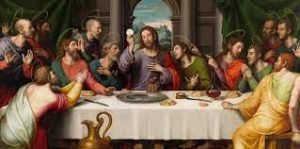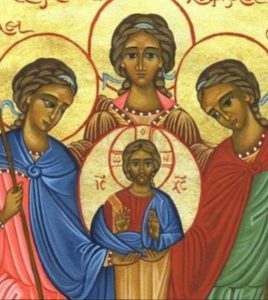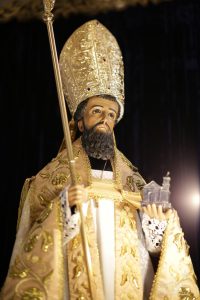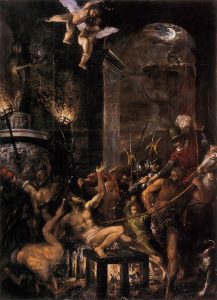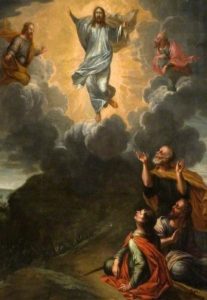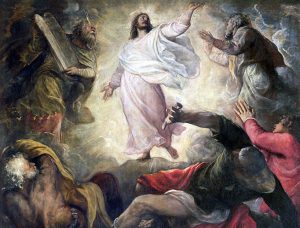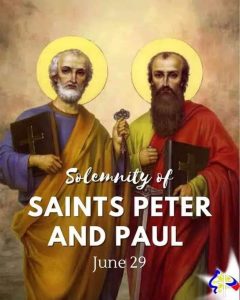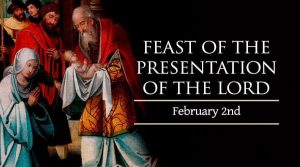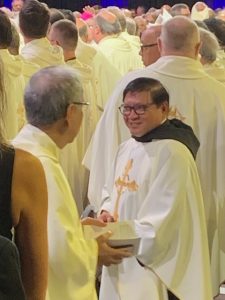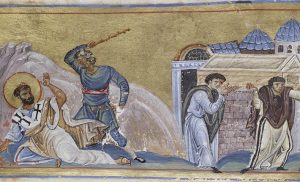There is the image of a mother who sacrificed herself waiting for hours under the heat of the sun, together with other poor people looking forward to receiving their ration of food to appease their hunger. This is a very moving moment to ponder the loving action of a mother to skip a meal only to share a handful of food with her starving children. Food is one of the essential needs for us to survive; yet for those who truly have the Eucharistic heart of Jesus, it means sharing! It is honorable to give up something precious and necessary in order to give life to others. This is what signifies the most holy body and blood of Jesus, His willingness to share so that we may live to the fullest.
Today, as we celebrate the Feast of Corpus Christi, we are invited to pray that in this Eucharistic feast, we allow ourselves to be consumed by this everlasting gift offered by Jesus to the Father as a perfect sacrifice together with His people. In faith, we acknowledge that Jesus is truly present, live and remaining with us as our provision and nourishment on this earthly journey.
From the book of Deuteronomy, Moses is leading the chosen people enroute to the promised land. He instructed the Israelites after leaving from Egypt to recall their sufferings, hunger, thirst, and other afflictions; however, celebrate that God is faithful to His promise. They need to look back recognizing many blessings by which they were called to reciprocate with total obedience and faithfulness to God’s commandments. As they journey together, Moses reminded them twice that God had fed them with bread, “Manna from heaven.” They ate and were strengthened for their journey; however, having weak faith, some failed to remember the goodness of the Giver and God’s faithfulness for them in the past. Thus, with Moses’ sense of fidelity to God, he walked with these people until they repented and became faithful in their encounter and relationship with God.
When our feeble senses fail to acknowledge God’s love of offering His Body and Blood in the Eucharist, it seems that we are acting like the Israelites who have failed also to remember those moments receiving the real Manna, the Holy Eucharist.
The second reading from the first letter of St. Paul to the Corinthians gives us simple illustration that we drink and eat from one cup and one loaf of bread as our participation in the body of Christ. Every time a priest says, “This is my body, this is my blood,” during the consecration, I am humbled by making Jesus truly present in our midst inviting us to partake in the body of Christ. When St. Augustine says, “we become what we eat,” it strikes to the depth of my heart that we have an obligation to advance the love, mission, and service of the Lord for we are One Body. We are connected to each other through Christ.
The gospel today is taken from the gospel of John, chapter 6, which is the discourse on Jesus being the “Bread of Life.” I wonder how our protestant brethren are able to comprehend this whole chapter for they don’t have the real grasp of accepting Jesus in the Holy Eucharist as His real presence. To understand the entire chapter, it presents a more developed theology of what Jesus is offering through the Eucharistic Bread, His body. To those who would obey His command to eat and live what they receive, Jesus is offering “Eternal Life.”
We are still in the year of Eucharistic Revival here in the US. All Catholics must be encouraged to revisit the ‘Meaning of the Mass,’ and its relevance to our Christian life. We know that the Eucharist is the “summit and the very source of our Christian life,” therefore, we participate and partake in the Eucharistic Meal with clarity of understanding and profoundly believing in Jesus’ genuine presence. It is by God’s love and manner that we are being fed.
After the preparation of gifts, the priests will say, “Pray, brethren, that my sacrifice and yours may be acceptable to God, the almighty Father.” The people rise and reply: “May the Lord accept the sacrifice at your hands for the praise and glory of His name, for our good and the good of all His holy Church.” This reminds us that we come to mass not as an obligation but to praise and glorify God, for our good and the good of the entire Church.
Sometimes we take for granted our responses during the mass that we forget what our purpose is for coming to mass.
In communion, we say “Amen” which means, “so be it” or “yes,” to His presence, holiness, and mission united in Jesus to serve and not to be served. We go in peace knowing that we have the responsibility to share what we have received by announcing the gospel and doing good deeds for everyone. We become Christ to others by how we live as good Catholics and the manner we conduct ourselves like Jesus. The enduring presence of Christ in the Eucharist strengthens us and unites us not only in Christ but with each other, sharing Christ’s life and mission.
God bless you.
Fr. Arlon, osa
—————————-
El Dictado del Corazón
Santísimo Cuerpo y Sangre de Cristo, Corpus Christi
- Deuteronomio 8:2-3, 14b-16a
- Salmo 147:12-13, 14-15, 19-20
- 1 Corintios 10:16-17
- Juan 6:51-58
La imagen de una madre que se sacrifica esperando horas bajo el calor del sol junto a otros pobres deseosos de recibir su ración de comida para saciar su hambre. Un momento muy conmovedor para reflexionar sobre la acción amorosa de una madre de escapar de una comida para compartir con sus hijos hambrientos. El alimento es una de las necesidades esenciales del hombre para sobrevivir, pero para quien verdaderamente tiene el corazón eucarístico de Jesús, ¡significa compartir! Es honorable renunciar a algo precioso y necesario para dar vida a los demás. Esto es lo que significa el cuerpo y la sangre santísima de Jesús, su disposición a compartir para que vivamos en plenitud.
Hoy, al celebrar la fiesta de Corpus Christi, estamos invitados a rezar para que en esta fiesta eucarística nos dejemos consumir por este don eterno ofrecido por Jesús al Padre como sacrificio perfecto junto a su pueblo. Con fe, reconocemos que Jesús está verdaderamente presente, vive y permanece con nosotros como nuestra provisión y alimento en este viaje terrenal.
En el libro de Deuteronomio, Moisés está guiando al pueblo elegido en el camino a la Tierra prometida. Instruyó a los israelitas después de salir de Egipto a recordar sus sufrimientos, hambre, sed y otras aflicciones, sin embargo, celebrar que Dios es fiel a su promesa. Necesitaban mirar hacia atrás reconociendo muchas bendiciones por las cuales fueron llamados a corresponder con total obediencia y fidelidad a los mandamientos de Dios. Mientras viajaban juntos, Moisés les recordó dos veces que Dios los había alimentado con pan, “Maná del cielo”. Comieron y se fortalecieron para seguir por el camino. Sin embargo, teniendo una fe débil, algunos no recordaron la bondad de quien los sostenía y la fidelidad de Dios hacia ellos en el pasado. Así, el sentido de fidelidad de Moisés a Dios, caminó con este pueblo hasta que se arrepintieron y se hicieron fieles en su encuentro y relación con Dios.
Cuando nuestros débiles sentidos fallan en reconocer el amor de Dios de ofrecer Su Cuerpo y Sangre en la Eucaristía, parece que estamos actuando como los israelitas que tampoco han recordado esos momentos de recibir el verdadero Maná, la Santa Eucaristía.
La segunda lectura de la primera carta de San Pablo a los Corintios nos da una ilustración simple de que bebemos y comemos de una copa y una hogaza de pan como nuestra participación en el cuerpo de Cristo. Cada vez que un sacerdote dice: “Este es mi cuerpo, esta es mi sangre”, durante la consagración, me siento honrado de que Jesús esté realmente presente en medio de nosotros, invitándonos a participar del cuerpo de Cristo. Cuando San Agustín dice: “Nos convertimos en lo que comemos”, golpea en lo más profundo de mi corazón que debemos promover el amor, la misión y el servicio del Señor porque somos un solo cuerpo. Estamos conectados a través de Cristo.
El evangelio de hoy está tomado del evangelio de Juan, capítulo 6, que es el discurso sobre Jesús como el “Pan de Vida”. Me pregunto cómo nuestros hermanos protestantes pueden comprender todo este capítulo porque no tienen la comprensión real de aceptar a Jesús en la Sagrada Eucaristía como SU presencia real. Para entender todo el capítulo presenta una teología más desarrollada de lo que Jesús está ofreciendo a través del Pan Eucarístico, Su cuerpo. Para aquellos que obedezcan Su mandato de comer y vivir lo que reciben, Jesús les ofrece “Vida Eterna”.
Todavía estamos en el año del Avivamiento Eucarístico aquí en los Estados Unidos. Se debe alentar a todos los católicos a revisar el ‘Significado de la Misa’ y su relevancia para nuestra vida cristiana. Sabemos que la Eucaristía es la “cumbre y la fuente misma de nuestra vida cristiana”, por lo tanto, participamos y tomamos parte en la Comida Eucarística con claridad de entendimiento y creyendo profundamente en la presencia genuina de Jesús. Es cómo el amor de Dios y la manera en que estamos siendo alimentados.
Después de la preparación de las ofrendas, los sacerdotes dirán: “Orad, hermanos, para que mi sacrificio y el vuestro sea agradable a Dios, Padre todopoderoso. El pueblo se levanta y responde: “Que el Señor acepte de vuestras manos el sacrificio para alabanza y gloria de su nombre, para nuestro bien y el de toda su santa Iglesia”. Esto nos recuerda que venimos a misa no por obligación sino para alabar y glorificar a Dios, por nuestro bien y el de toda la Iglesia.
A veces damos por sentado nuestras respuestas durante la misa que olvidamos nuestro propósito de venir a misa.
En la comunión decimos “Amén”, que significa “así o sí”, a su presencia, santidad y misión unidos en Jesús para servir y no para ser servido. Vamos en paz sabiendo que tenemos la responsabilidad de compartir lo que hemos recibido anunciando el evangelio y haciendo buenas obras para todos. Nos convertimos en Cristo para los demás por la forma en que vivimos como buenos católicos y la manera en que nos comportamos como Jesús. La presencia permanente de Cristo en la Eucaristía nos fortalece y nos une no sólo en Cristo pero con los demás, compartiendo la vida y la misión de Cristo.
Dios los bendiga.
Padre Arlón, osa

